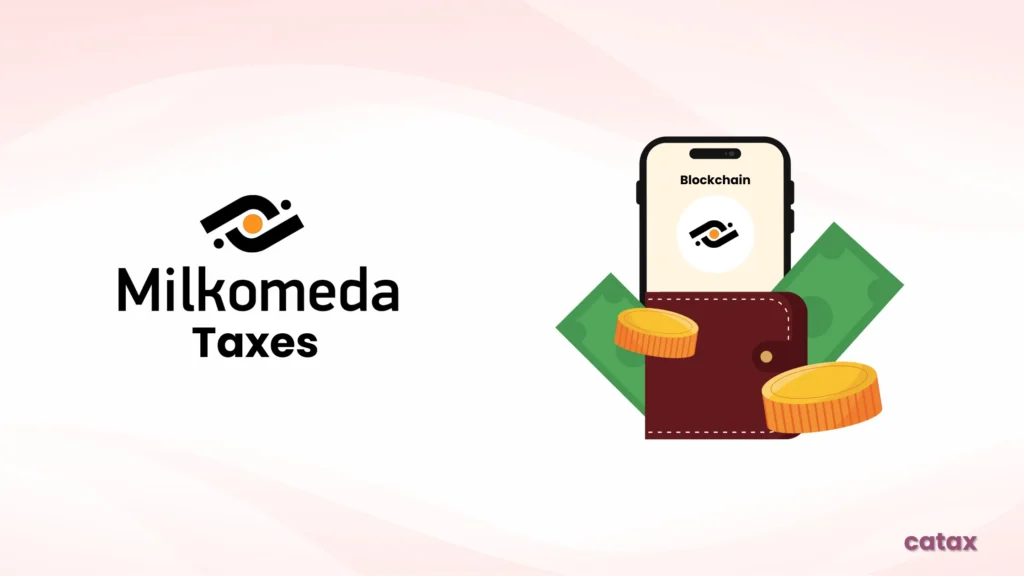Cryptocurrency tax rules vary by country, and Evmos (EVMOS) taxes transactions may be taxed differently depending on local regulations. Whether you buy, sell, trade, or stake EVMOS, understanding how tax authorities classify these activities helps you stay compliant and avoid penalties.
This guide simplifies Evmos tax rules so you can manage your taxes confidently and stay on the right side of the law.

How to Connect Your Evmos Wallet to Catax?
To track your Evmos (EVMOS) transactions and calculate taxes effortlessly, follow these steps to connect your wallet to Catax:
- Open your Evmos wallet or access a block explorer (such as Keplr, Cosmostation, Ledger, or any supported wallet).
- Copy your public wallet address from your Evmos wallet.
On Catax:
- Log in to Catax and select your country.
- Select Chain, then search for Evmos Wallet.
- Paste your public address and click Connect.
Once connected, Catax will automatically track your EVMOS transactions and simplify your crypto tax reporting.
Calculate My Taxes ➤Are Evmos (EVMOS) Transactions Taxable?
Yes, in most countries, Evmos (EVMOS) transactions are taxable. Tax authorities may classify EVMOS as a capital asset, property, or income depending on how it’s used.
When Do You Have to Pay Taxes on Evmos (EVMOS)?
You may need to pay taxes when you:
- Sell EVMOS for a profit – Selling your Evmos tokens for more than you paid typically triggers capital gains tax.
- Trade EVMOS for another cryptocurrency – Swapping EVMOS for Bitcoin, Ethereum, or any other crypto may be considered a taxable event.
- Use EVMOS for purchases – Buying goods or services with EVMOS can create a taxable gain if the token’s value has appreciated.
- Earn EVMOS from staking – EVMOS earned through staking is generally treated as income and taxed when received.
- Receive EVMOS as payment – If you are paid in EVMOS for goods or services, it’s usually taxed as income based on its market value at the time of receipt.
Because tax treatment varies by jurisdiction, always check your country’s specific crypto tax rules.
Can You Deduct Trading Fees and Other Costs?
Evmos users often ask if they can deduct costs associated with trading or managing EVMOS. This depends on your local tax laws.
Some countries allow deductions for:
- Trading fees when buying or selling EVMOS
- Network or transaction fees when transferring EVMOS between wallets
Others may limit deductions to:
Always review your local tax rules to understand which expenses you can legally claim.
How Is Evmos (EVMOS) Taxed Based on Holding Period?
Your tax rate on EVMOS profits might change based on how long you held the tokens:
- Short-term holdings (less than one year) – Typically taxed at your regular income tax rate.
- Long-term holdings (more than one year) – Some countries offer reduced tax rates for long-term crypto gains.
- Flat-rate systems – In certain jurisdictions, a flat tax rate applies, regardless of the holding period.
Understanding your country’s rules on crypto taxation can help you optimize your tax strategy and minimize liabilities.
You can also check out our Country-Specific Guide for Crypto in Your country. This guide provides insights on regulations, tax implications, and compliance measures breifly explained for each country.
How Is Staking Income Taxed?
Staking Evmos (EVMOS) can earn you passive income, but how that income is taxed depends on your country’s regulations. Some countries tax staking rewards immediately when you receive them, while others only apply tax when you sell or exchange the rewards.
How Countries Tax Staking Rewards
- Taxed as income – In some countries, staking rewards are treated like salary or interest income. This means you’re taxed on the market value of the EVMOS at the time you receive the rewards.
If you stake Evmos, it’s important to understand when taxes apply. Some countries tax staking rewards even if you never sell or spend them.
To avoid unexpected tax bills, check how your country treats staking rewards before participating in Evmos staking.
Can You Claim Evmos Losses for Tax Benefits?
Not every Evmos investment results in profit. If you sell EVMOS at a loss, you might be able to reduce your tax liability—depending on your country’s laws. How Countries Handle Crypto Losses:
- Loss offsets – Some countries allow you to deduct Evmos losses from your crypto or capital gains, reducing the amount of taxable income.
- Loss carryforward – If you didn’t have gains this year, some tax systems allow you to carry forward your losses to offset future profits.
- Limited or no deductions – Certain jurisdictions don’t allow any deductions for crypto losses, meaning you can’t reduce your taxes even if you lost money.
Keeping detailed and accurate records of all your EVMOS transactions is key to claiming these benefits correctly.
How to Stay Compliant with Evmos (EVMOS) Tax Rules
Crypto tax regulations continue to evolve, so it’s essential to stay informed and compliant. To avoid fines or legal issues:
- Understand how your country taxes Evmos – Are EVMOS transactions classified as capital gains, income, or business revenue?
- Keep detailed records – Document all activities involving EVMOS including buying, selling, trading, staking, and spending.
- Use a crypto tax tool like Catax – Catax automatically tracks transactions and calculates taxes, helping you stay organized and compliant.
- Consult a tax expert – If you’re unsure how Evmos is taxed in your region, a professional can provide guidance based on local laws.
Staying proactive with your recordkeeping and understanding your tax obligations will help you manage your Evmos taxes smoothly and avoid penalties.
Book a Free Consultation Now →

